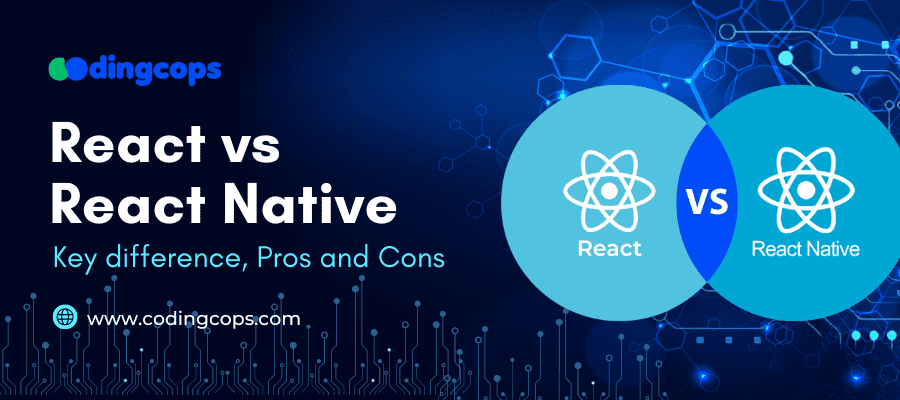Every business today needs a web app or a website to interact with its customers and share its products, services, or brand with the world. Web apps have great importance and it’s essential to know the top formations of the day.
JavaScript is an essential part of web development and React and React Native are one of the top JavaScript frameworks.
What Is ReactJS?

ReactJS is a JavaScript library and it combines a new way of rendering web pages and the speed of JavaScript. This makes ReactJS versatile and responsive for the users. React has completely changed the development approach of Facebook.
The interesting part is that React Native uses its framework to create the ReactJS framework and ReactJS assists in building components with React Native.
Advantages of ReactJS
- Using ReactJS, developers can reuse different components during the app development process. Every component has its own rendering and logic. Developers can reuse the logic whenever they want. This leads to quicker application development.
- There are many articles, documentation, tutorials, and guides available on the internet to learn React. Thus, anyone can learn and get a quick understanding of ReactJS. Additionally, if a developer knows JavaScript, it becomes easier to learn React.
- Virtual DOM is another amazing advantage of React JS that ensures higher performance. It makes sure that there is a lightweight copy of the real ROM that is updated. It further improves usability and effectiveness.
- For businesses that want to adapt quickly, the option to React developers is invaluable, as these professionals use their expertise to increase development speed and product quality.
Disadvantages of ReactJS
- ReactJS does provide different third-party plugins and modules but it has only a few native modules. Developers need to combine CSS and HTML code into JSX using third-party integration.
- There are constant library updates with ReactJS that interfere with the speed of the development process. But, React changes and improvements are now reserved for libraries and other updates and this makes the code more reliable.
- React uses JSX which is a plugin or extension that allows developers to write HTML code in React JS. Many developers don’t prefer JSX documentation and it might also be difficult for beginners to learn JSX.
What Is React Native?

React Native is a hybrid application development framework for Android and iOS. This tool uses the same principles as ReactJS. Soon after its release, companies all over the world started using React Native as a mobile-first strategy.
It is a cross-platform mobile framework that uses React to create exclusive apps and websites. With this tool, developers can create mobile applications by assembling native app components into JavaScript. The apps created with React Native can run smoothly on different platforms like iOS, Windows, and Android.
Advantages of React Native
- When a developer deploys a React Native app on different platforms, there is less need for optimization and debugging. It needs less enhancement and testing as the app is distributed on different platforms.
- One of the main advantages of using React Native is that it enables developers to create cross-platform applications. As the code is reusable, one codebase can be used to deploy on both iOS and Android platforms.
- The base language of React Native is JavaScript. Thus, it offers the same application development but with different valuable features.
Disadvantages of React Native
- While using React Native app load time is one of the main concerns. The load time issue results because of the JavaScript thread that takes more time to deploy.
- Frequent updates are also one of the disadvantages. But it is a plus point too as these updates keep the applications up to the mark.
- When an app has many features, the development time decreases because of the dependency on third-party libraries and native modules shortage.
ReactJS vs React Native

To simplify this, take the example of siblings. Siblings have common features and similarities, but at the same time, they have differences too.
The same logic applies to these two technologies; React and React Native. Let’s have a look at the differences between these technologies.
- Efficiency
React
When it comes to displaying interactive content, ReactJS is more efficient than React Native. The reason is that ReactJS uses a virtual Document Object Model or DOM that offers quicker rendering times. ReactJS is a lightweight tool as compared to React Native and this also increases efficiency. If you’re looking for a more efficient tool, ReactJS is the ideal choice.
React Native
Contrary to that, React Native uses a real Document Object Model that can result in slow performance while rendering complex pages.
- Feasibility
React
ReactJS is more suitable for web apps.
React Native
React Native is more suitable for mobile application development.
However, developers can use both of these frameworks for app development according to the project requirements.
- Installation Process
React
ReactJS can be suitable for any web platform. It is easy to set up and developers can easily get started with it. React also has a large community of developers and users. But, there’s an issue. React doesn’t support mobile devices natively. There will be a requirement for third-party toolkits like Cordova and React Native if you want to create mobile apps with ReactJS.
React Native
React Native is a mobile-specific framework and is used to build cross-platform applications. This framework is difficult to set up as compared to ReactJS. However, it offers a more consistent user experience and better performance across different platforms.
- Navigation
React
ReactJS uses a traditional browser-based approach. It not only affects the development process but also the user experience. It is perfect for apps that run in web browsers.
React Native
React Native depends on the navigational components of the native platform. It is a good option for building native mobile apps.
However, there are cases of hybrid approaches that combine components of both of these frameworks. Assessing the requirements of the project is the best way to choose between React Native and ReactJS.
- Compatibility
React
ReactJS is a JavaScript library and developers use it to create user interfaces. It is compatible with a wide range of browsers including Internet Explorer.
React Native
Contrary to that, React Native helps in developing native mobile applications. It is compatible with the two mobile platforms, Android and iOS. Because of its native components, it offers a better user experience.
- Storage
React
ReactJS is an ideal option for projects that need high-performance storage, for instance, real-time web apps. It helps in storing large amounts of information. However, it is not suitable for larger projects with complex requirements because of its inability to adapt.
React Native
For larger projects, React Native can come to the rescue. It is a better choice for projects that need adaptability. It also offers cross-platform compatibility and better support for offline storage.
- Search Engine-Friendly
React
ReactJS uses standard HTML tags. These tags are easier for search engines to index, so ReactJS is more search-friendly than React Native. The code of ReactJS is easier to read and more organized and search engines can easily crawl and index.
React Native
It doesn’t mean that you can’t make React Native search engine friendly. It’s just achieving good SEO is challenging with this framework.
How Are These Two Similar?
React Native and ReactJS are two famous options for creating user interfaces. Both of these frameworks are based on the React JavaScript library. That’s the reason, there are many similarities between these two. Here are some of the similarities between ReactJS and React Native:
- ReactJS and React Native have wide ecosystems and there are many tools and plugins available.
- Both of these use declarative syntax that makes code easy to understand and read.
- ReactJS and React Native provide a virtual DOM that improves the overall performance by uniting updates.
- These two frameworks are open-source which means developers can use them without paying extra.
- With ReactJS and React Native, developers can reuse components throughout an app.
- Both of these frameworks have strong community support.
Conclusion
The answer to the question of which one is better, React Native vs ReactJS depends on what you’re building. ReactJS is a better choice for web apps because it offers cross-browser compatibility, quicker development speed, and many other useful features.
Contrary to that, React Native is a better choice for mobile app development because it offers cross-platform compatibility for both Android and iOS, is close to native performance, and provides access to native APIs.
More Related Blogs
- React vs. Backbone.js
- Top 10 Future of React in 2024
- React Lifecycle Methods
- React vs React Native
- React vs Angular
- Spring Boot Developers





